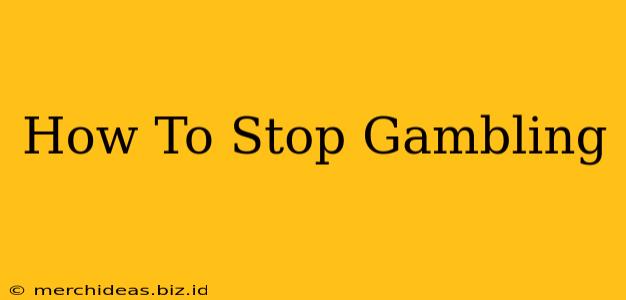Gambling addiction, or compulsive gambling, is a serious issue affecting millions worldwide. It's a progressive illness that can lead to devastating financial, emotional, and social consequences. But the good news is that recovery is possible. This comprehensive guide offers practical steps and resources to help you stop gambling and rebuild your life.
Understanding Your Gambling Addiction
Before you can stop gambling, you need to understand why you gamble. Is it an escape from stress, boredom, or depression? Do you chase losses? Identifying your triggers is crucial for developing an effective recovery plan.
Recognizing the Signs of Problem Gambling:
- Chasing losses: Continuously betting to recoup previous losses.
- Lying about gambling: Hiding the extent of your gambling from family and friends.
- Neglecting responsibilities: Prioritizing gambling over work, family, or other commitments.
- Financial problems: Accumulating debt due to gambling.
- Withdrawal symptoms: Experiencing anxiety, irritability, or restlessness when unable to gamble.
- Loss of control: Feeling unable to stop gambling even when you want to.
Steps to Stop Gambling
Stopping gambling is a journey, not a destination. It requires commitment, perseverance, and support. Here’s a breakdown of effective steps:
1. Seek Professional Help:
This is arguably the most important step. A therapist or counselor specializing in addiction can provide personalized guidance, tools, and support. They can help you identify underlying issues contributing to your gambling and develop coping mechanisms. Consider therapy options like Cognitive Behavioral Therapy (CBT) which helps change negative thought patterns and behaviors.
2. Join a Support Group:
Connecting with others who understand your struggles can be incredibly helpful. Support groups like Gamblers Anonymous (GA) offer a safe and confidential space to share experiences, learn coping strategies, and receive peer support. The shared experience fosters a sense of community and understanding, crucial for sustained recovery.
3. Develop Healthy Coping Mechanisms:
Identify activities that provide healthy distractions and replace the urge to gamble. This could include:
- Exercise: Physical activity releases endorphins, boosting your mood.
- Hobbies: Engage in activities you enjoy, such as reading, painting, or playing music.
- Spending time with loved ones: Nurture your relationships with family and friends.
- Mindfulness and meditation: Practicing mindfulness can help you manage cravings and urges.
4. Address Underlying Issues:
Gambling addiction often masks underlying mental health issues like depression, anxiety, or trauma. Addressing these underlying problems is vital for long-term recovery. Therapy can help you uncover and address these issues.
5. Limit Access to Gambling:
Remove temptation by:
- Deleting gambling apps: Get rid of any apps on your phone or computer related to gambling.
- Blocking gambling websites: Use website blockers to prevent access to online gambling sites.
- Avoiding gambling establishments: Stay away from casinos, racetracks, and other places where gambling takes place.
6. Financial Management:
Seek professional financial advice to manage debt and create a budget. This can help regain control of your finances and prevent future gambling-related financial problems.
Maintaining Long-Term Recovery
Recovery from gambling addiction is an ongoing process. Relapses can occur, but they are not failures. They are opportunities to learn and adjust your recovery plan.
Strategies for Long-Term Success:
- Regular therapy sessions: Continue attending therapy sessions to maintain progress and address any new challenges.
- Active participation in support groups: Consistent attendance at support group meetings provides ongoing support and accountability.
- Self-care: Prioritize your physical and mental health through exercise, healthy eating, and sufficient sleep.
- Strong support system: Lean on your support network – family, friends, and support groups – for encouragement and assistance.
Remember: You are not alone. Recovery from gambling addiction is possible with the right support and commitment. Take the first step today and reach out for help. Your life can be transformed.
